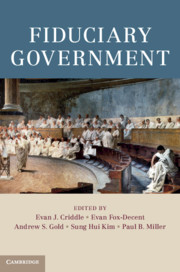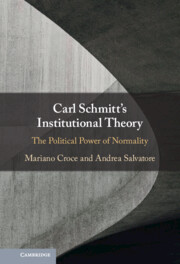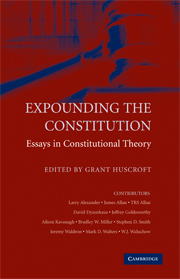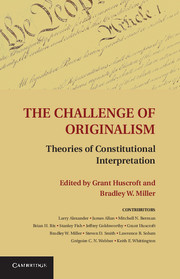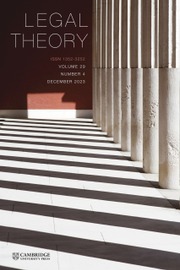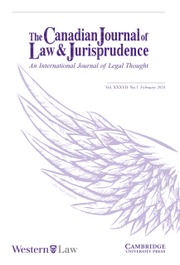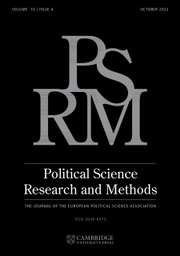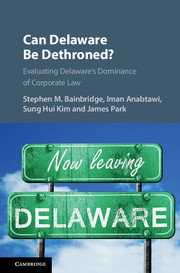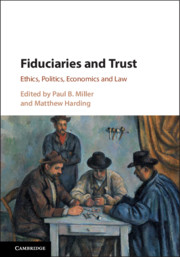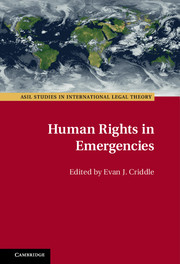Fiduciary Government
$169.00 (R)
- Editors:
- Evan J. Criddle, William and Mary Law School, Virginia
- Evan Fox-Decent, McGill University, Montréal
- Andrew S. Gold, Brooklyn Law School
- Sung Hui Kim, University of California, Los Angeles School of Law
- Paul B. Miller, Notre Dame Law School, Indiana
- Date Published: November 2018
- availability: Available
- format: Hardback
- isbn: 9781107194243
$
169.00
(R)
Hardback
Other available formats:
eBook
Looking for an examination copy?
This title is not currently available for examination. However, if you are interested in the title for your course we can consider offering an examination copy. To register your interest please contact [email protected] providing details of the course you are teaching.
-
The idea that the state is a fiduciary to its citizens has a long pedigree - ultimately reaching back to the ancient Greeks, and including Hobbes and Locke among its proponents. Public fiduciary theory is now experiencing a resurgence, with applications that range from international law, to insider trading by members of Congress, to election law and gerrymandering. This book is the first of its kind: a collection of chapters by leading writers on public fiduciary subject areas. The authors develop new accounts of how fiduciary principles apply to representation; to officials and judges; to problems of legitimacy and political obligation; to positive rights; to the state itself; and to the history of ideas. The resulting volume should be of great interest to political theorists and public law scholars, to private fiduciary law scholars, and to students seeking an introduction to this new and increasingly relevant area of study.
Read more- Proposes legal solutions, based on fiduciary principles, to the problem of corruption among public officials
- Analyzes an alternative account of the authority of the state that is not premised on voluntarist or consensual assumptions about the origins of state authority
- Provides an alternative way of understanding the authority and obligations of public officials that is both coherent and continuous with the authority and obligations of private fiduciaries
Reviews & endorsements
‘This excellent and novel volume seeks to reinstate the fiduciary principle to its historic place in regulating a government's relationship with its people. After two centuries of neglect, a growing number of mainly North American scholars have embarked enthusiastically on this task. They have recognized, correctly, that resort to this principle, with necessary modernization, is capable ultimately of providing greater clarity, coherence and guidance in legal and political thought than that which prevails today.' The Honourable Justice Paul Finn, Federal Court of Australia
See more reviews‘The fiduciary theory of government holds that governments and government officials only hold power in trust for the benefit of others; therefore they have special duties of fairness and good faith. Debating both the attractions and the problems of the fiduciary conception, these essays are a valuable addition to a growing literature.' Jack M. Balkin, Yale Law School
Customer reviews
Not yet reviewed
Be the first to review
Review was not posted due to profanity
×Product details
- Date Published: November 2018
- format: Hardback
- isbn: 9781107194243
- length: 350 pages
- dimensions: 236 x 160 x 25 mm
- weight: 0.62kg
- availability: Available
Table of Contents
Introduction. Fiduciary government: provenance, promise, and pitfalls Evan J. Criddle, Evan Fox-Decent, Andrew S. Gold, Sung Hui Kim and Paul B. Miller
Part I. Modes of Governance:
1. Fiduciary representation Paul B. Miller
2. Two problems of fiduciary government D. Theodore Rave
3. Guardians of legal order: the dual commissions of public fiduciaries Evan J. Criddle and Evan Fox-Decent
4. Fiduciary theory: the missing piece for positive rights Laura S. Underkuffler
Part II. Historical Approaches:
5. 'The state is a minor': fiduciary concepts of government in the Roman law of guardianship Daniel Lee
6. Fiduciary government and government officers' incentives Nicholas R. Parrillo
Part III. The Problem of Legitimacy:
7. Fiduciary political theory and legitimacy Stephen R. Galoob and Ethan J. Leib
8. The state as a wrongful fiduciary Andrew S. Gold
Part IV. Corruption and Breach of Trust:
9. The Supreme Court's fiduciary duty to forgo gifts Sung Hui Kim
10. Congressional officials and the fiduciary duty of loyalty: lessons from corporate law Donna M. Nagy
11. The American law of local officials as fiduciaries: lessons on fiduciary government's potential and limits Nadav Shoked
Part V. Skeptical Challenges:
12. Pluralism and the public trust Seth Davis
13. The public trust Timothy Endicott.
Sorry, this resource is locked
Please register or sign in to request access. If you are having problems accessing these resources please email [email protected]
Register Sign in» Proceed
You are now leaving the Cambridge University Press website. Your eBook purchase and download will be completed by our partner www.ebooks.com. Please see the permission section of the www.ebooks.com catalogue page for details of the print & copy limits on our eBooks.
Continue ×Are you sure you want to delete your account?
This cannot be undone.
Thank you for your feedback which will help us improve our service.
If you requested a response, we will make sure to get back to you shortly.
×
